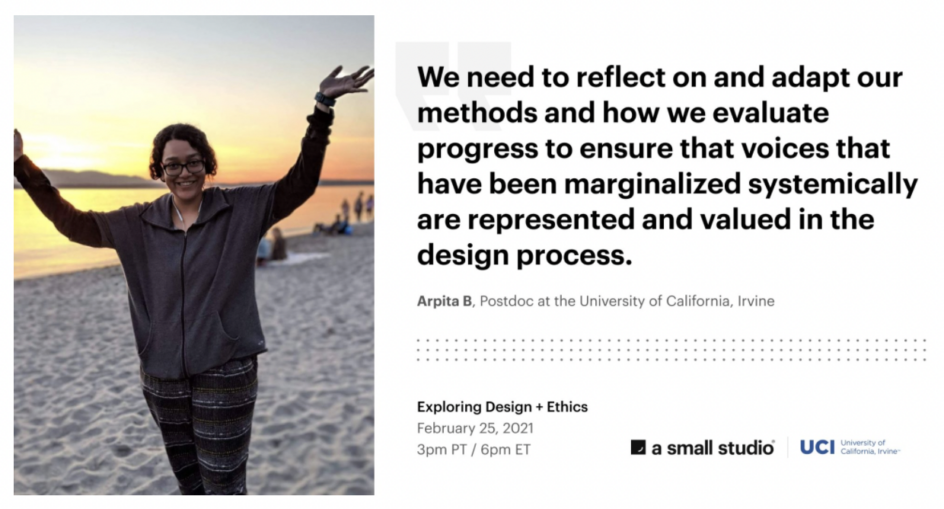Exploring Design + Ethics: Postdoc Arpita Bhattacharya and Industry Leaders Advocate for Inclusion
Since September 2020, UCI and the creative agency a small studio have been hosting a series of free, virtual workshops focused on ethical design. The first workshop explored innovation and social progress, the second examined inclusive design and the third looked at power dynamics.
Register now for the fourth Exploring Design + Ethics workshop, which will be held at 3 p.m. on Thursday, Feb. 25, 2021. Postdoctoral researcher Arpita Bhattacharya from UCI’s Department of Informatics, who has been working with students in the Social and Technological Action Research (STAR) lab focusing on the health of marginalized communities, will serve as a panelist alongside the following industry leaders:
- Michael Dimaano, senior product designer at Ford Motor Co.;
- Jacob Hernandez, product designer at LinkedIn;
- Desiree Gibbs, AVP senior digital designer at Citi;
- Gus Granger, client engagement partner at VSA Partners; and
- John B. Johnson, identity architect at a small studio.
The group will explore how best to elevate marginalized voices.

“Efforts for inclusion should begin right at the ideation phase of design,” says Arpita, who plans to raise the following questions during the discussion:
- What design or research methods are we using that might further the divide in access and power dynamics, thus excluding people from relaying their voices?
- What assumptions are we making about communities without including them?
- What trade-offs are we making because of systemically imposed timelines and constraints?
“We need to critically reflect on (1) adapting our methods to invite marginalized communities to sit at the table with us and (2) evaluating progress in design to foster environments that will encourage and support people working on difficult societal problems,” she says. “Sustainably tackling challenges for communities that have been marginalized and/or oppressed by the system involves advocacy.” She further explains that such advocacy requires supporting “researchers and designers in processing their own emotional labor regularly as an integral part of the design process with mechanisms in place for mitigating burnout.”
Register today to join this important discussion and learn how to advocate for inclusion throughout the entire design process.
— Shani Murray